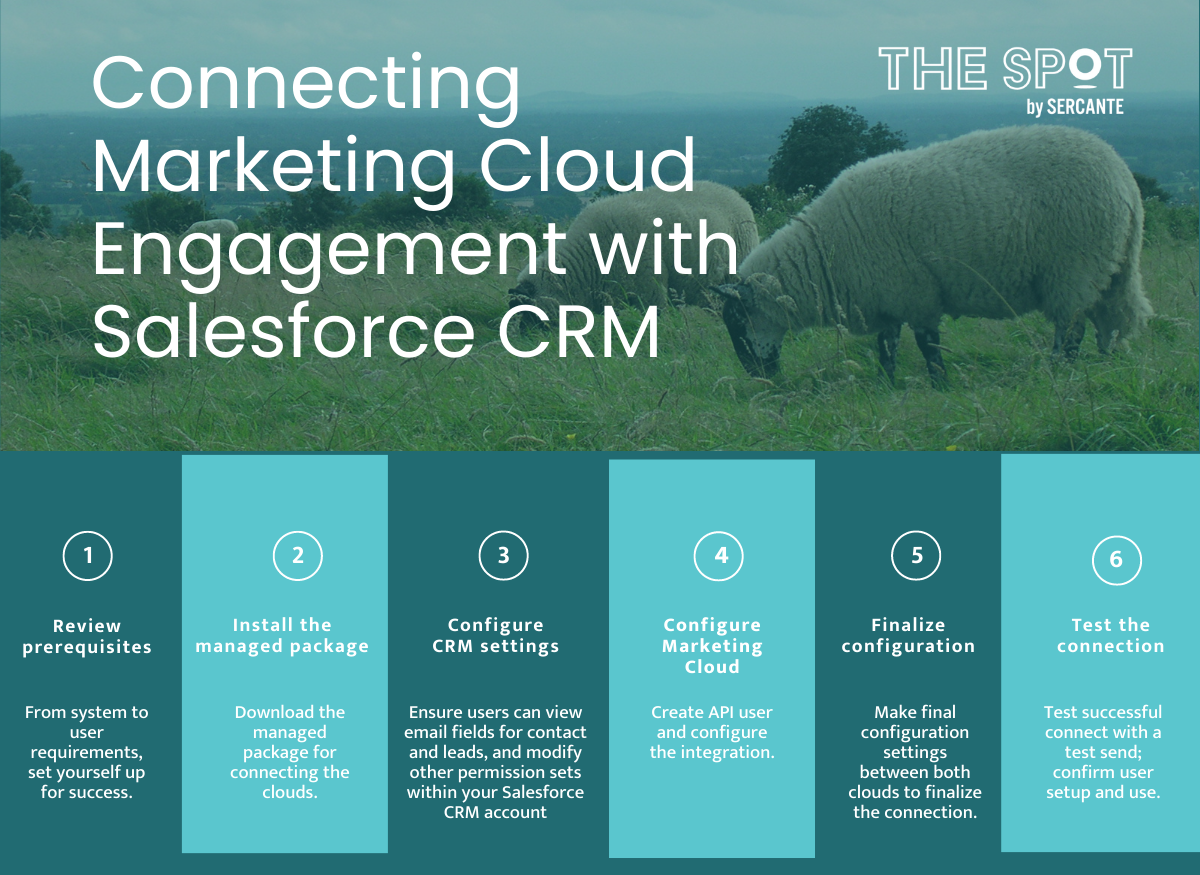Does your marketing and sales data live in separate places? Do you want all customer details to live in one place? If so, Marketing Cloud Connect is the answer.
Marketing Cloud Connect combines the digital marketing capabilities of Marketing Cloud Engagement with the data management, segmentation, and campaign management tools in Sales Cloud.
What is Marketing Cloud Connect?
Marketing Cloud Connect is an installed package that integrates your Salesforce CRM (Sales Cloud/Service Cloud) with Salesforce Marketing Cloud Engagement. By creating unitary customer relationships with more data-driven, personalized conversations and the ability to automate the customer journey, Marketing Cloud Connect provides access to powerful Marketing Cloud tools directly within Sales or Service Clouds and vice versa.
Connecting Marketing Cloud Engagement with Salesforce CRM
The overall process of connecting these two clouds together is relatively straightforward, and it can be summarized in a 6-step process. However, there are key items to consider along the way.

Step 1. Review prerequisites for implementation
From system to user requirements, set yourself up for success by reviewing the prerequisites or requirements you’ll need for Marketing Cloud Connect implementation.
Step 2. Install the Marketing Cloud Connect managed package
Download the managed package for connecting the Salesforce clouds. To do that, you’ll copy-paste the URL below that relates to where you’ll install the package. Remember to log in to Salesforce using your administrator credentials.
- Production Org: https://sfdc.co/MCC
- Sandbox Org: https://sfdc.co/MCCSandbox
Step 3. Configure CRM settings
Ensure users can view email fields for contact and leads, as well as modify any additional permission sets within your Salesforce CRM account.
Step 4. Configure Marketing Cloud
Create the API user and configure the integration. This will enable core system communication activities between Marketing Cloud and Sales or Service Cloud.
Step 5. Finalize configuration
Make final configuration setting adjustments between both clouds to finalize the connection.
Step 6. Test the connection
Finally, complete a test to check for a successful connection. You’ll complete this step with a test email send. Then, you’ll confirm user setup. Once all the tests are successful, you can start using it.
Considerations for implementing Marketing Cloud Connect
Keep the following considerations in mind as you complete the implementation.
User Admin Level Access
The user setting up the connection should have admin access to both Marketing Cloud and Sales Cloud.
1:2 Relationship
Marketing Cloud Connect requires a relationship between a single Marketing Cloud account and one or more Salesforce orgs. Your Marketing Cloud account must be provisioned and enabled for use with Marketing Cloud Connect before connection.
Subscriber Key
The Subscriber Key is required for Marketing Cloud Connect. If it is not enabled in your Marketing Cloud account, complete a Subscriber Key Migration before proceeding with the connection process.
Avoid using email addresses as the Subscriber/Contact Key in Marketing Cloud.
Instead, use something that is:
- Unique
- Persistent
- Channel agnostic
- Global
We recommend using Salesforce Contact ID as your Marketing Cloud Subscriber Key to deliver maximum synchronization between the two clouds. Learn more about contact model relationships here.
Important Note: If the email address has already been set as the Subscriber Key, please reach out to your Salesforce consulting partner or Salesforce Account Executive before connecting Marketing Cloud and Sales Cloud. They’ll provide more guidance and help you to avoid duplicates.
Custom Tabs Available
Ensure that four custom tabs are available in your Salesforce org.
Multiple Licenses
To use most Marketing Cloud Connect functionality, users need a Marketing Cloud license and a Sales or Service Cloud license.
Lightning Experience
Salesforce Lightning Experience is not supported for Marketing Cloud Connect features. Those using Lightning Experience with Salesforce are automatically redirected to Salesforce Classic when any Marketing Cloud Connect tabs are clicked.
Using Marketing Cloud Connect
While the initial focus may be getting Marketing Cloud Connect set up properly, the real magic occurs in using these clouds together.
Top benefits include:
- Syncing CRM data to make smarter decisions and personalize every message in Marketing Cloud Engagement. By tapping into the Synchronized Data sources and Contact Builder, marketers are able to create highly targeted communications while avoiding static or outdated data at the time of send.
- Automating 1:1 cross-channel journeys across clouds and bi-directionally. You can listen and react to changes in any object across the Salesforce suite of cloud products for journey enrollment. Additionally, the sync can update tasks, open and close service cases, or update sales opportunities based upon interactions that have occurred in Marketing Cloud.
- Empowering sales & service users to send Marketing Approved Emails within their native platform. – can be sent on a 1:1 basis, to a specific report or prospects/leads that are part of an existing campaign in Sales Cloud; users will also be able to see performance tracking results also from Sales Cloud
- Sending triggered actions from Sales Cloud via Apex Trigger for a specific Object – typically for a contact based upon a set trigger such as new record is created or lead is updated
Benefits of Salesforce Marketing Cloud Connect Integration
By enabling Marketing Cloud Connect functionality, you’re helping to reduce previous data silos that may have once existed. Through a single source that consolidates your marketing and sales data, you’re able to send highly personalized, super-targeted data-rich communications more confidently.
To learn more about how to implement Marketing Cloud Connect for your organization and how to maximize Marketing Cloud Connect in your digital marketing efforts, contact us today.











